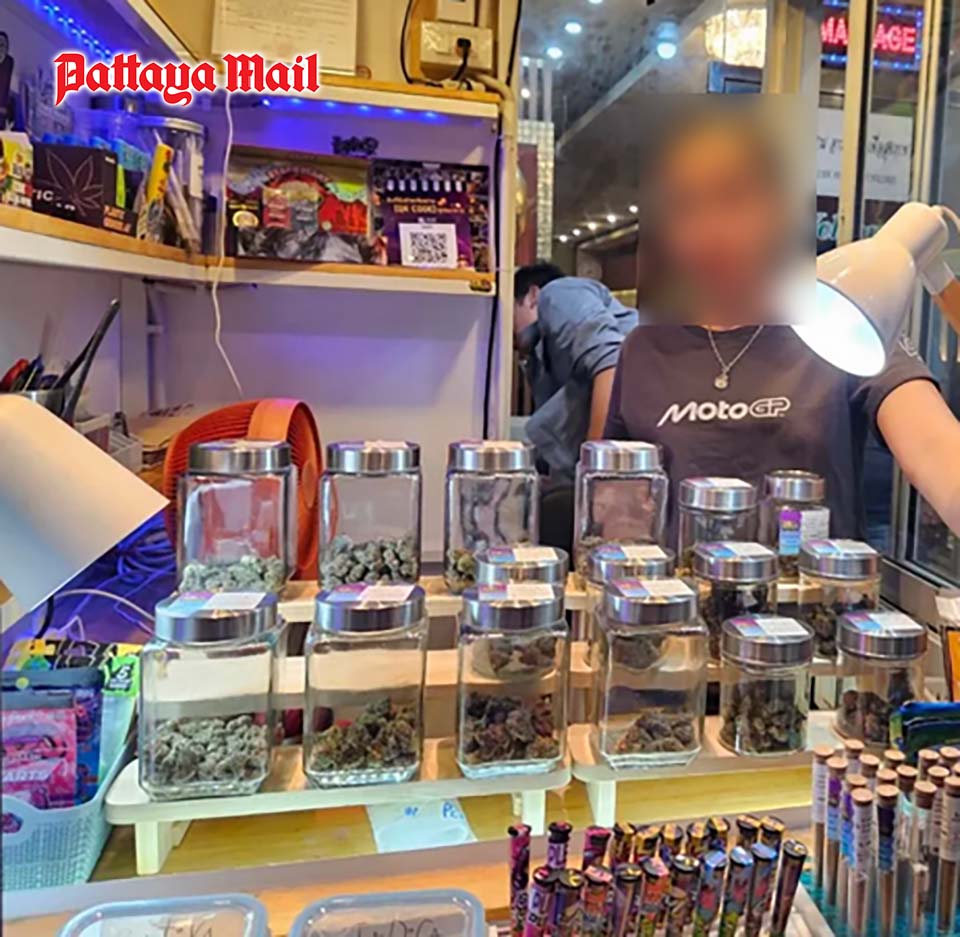
WWW.PATTAYAMAIL.COM
‘Prescription-only’ chaos leaves Pattaya cannabis industry in the smoke
Prescription-only? Nobody knows how it works—but closures are already happening. Public smoking should’ve been the target, not the entire industry.
PATTAYA, Thailand – That’s the mood around Pattaya this week as cannabis businesses brace for a sharp and largely unexplained shift to a “prescription-only” model — a term now repeated everywhere but still understood by almost no one. What kind of prescription? From which doctor? How much will it cost? Will tourists qualify? Nobody has the answers — not the officials, not the dispensary owners, and definitely not the customers.
One frustrated owner of a cannabis shop near Walking Street summed it up:
“If I ask ten different people what ‘prescription only’ means, I get eleven different answers. But what I do know is I’ve got three employees, rent due, and a fridge full of unsold product. Now what?”
What’s even clearer is that smoking cannabis in public will soon bring serious consequences — and that part, many locals would argue, should’ve been the rule from the beginning.
“How much beer do you drink before getting drunk?” one expat scoffed. “The point is, it’s not about the weed — it’s the lack of rules. You want to drink? Go to a bar. You want to smoke? Go to a toilet, apparently. That’s the whole problem.”
For a city like Pattaya, where the lines between entertainment and excess are already blurry, the government’s U-turn feels more like punishment than policy. In the rush to ban public use and shut down easy access, small entrepreneurs are left shattered.
When cannabis was effectively decriminalized in 2022, Pattaya didn’t tiptoe — it sprinted. Dispensaries opened across the city like convenience stores. Tourists and locals walked in freely, bought flower, and often lit up just meters from beachgoers or bar terraces.
While the freedom thrilled some, others were repulsed.
“I hate the smell of it,” said one longtime Thai resident. “It hangs in the air ten times longer than cigarette smoke. Honestly, it ruined the vibe of many areas. They should’ve banned smoking in public places from day one — just like with cigarettes.”
That reasonable middle ground — regulating where cannabis is consumed, not the entire industry — was missed. Now it’s all crashing down. Worse still, there was no warning.
“They should’ve given at least a year’s notice,” said a British investor who opened a hybrid bar-and-weed lounge last year. “Instead, we were encouraged to open up, build fancy shops, stock up inventory — and now we’re being pushed off the cliff.”
Compensation? Don’t Hold Your Breath
There was talk — briefly — of compensation for affected business owners. But that conversation has gone silent, like many others. Even if something does materialize, few believe it will amount to much.
“Highly unlikely to be anywhere near what people lost,” one bar owner commented. “And even if they give something, claiming it will be a full-time job with a folder full of stamped documents. I don’t have the energy — or the faith.”
Another longtime visitor added, “I’m not into cannabis, it’s not my cup of tea, but I feel for the small shop owners. The big boys will find loopholes. But it’s the Thai auntie who borrowed money to open a dispensary that’ll lose everything.”
Some believe many of the high-end dispensaries were never about weed to begin with. A retired Thai police contact, speaking anonymously, told a foreign acquaintance that many shops were money-laundering fronts.
“You walk past these ultra-fancy shops,” the expat said, “decked out like a nightclub, with imported sofas and LED walls — and no customers. Prices more expensive than California. They say they spent millions, but half of it’s from Lazada. You do the math.”
Even if that’s partly true, the irony is brutal: the possibly criminal shops may survive through loopholes or connections — while legitimate small owners will be the ones shut down first.
Is a Smarter Path So Hard?
For many, this could have been avoided with just one simple rule: no smoking in public. That’s it. Create designated lounges — like cigar bars or shisha cafes — and let the rest of the city breathe. Instead, the government is treating the whole industry as a nuisance to be swept away.
“It’s really not that hard,” said one tourist. “You don’t want people smoking weed in the streets? Fine. Enforce that. But don’t kill the whole industry. You don’t close all the bars just because a few drunks got loud.”
Some have even suggested creating a “green zone” on a stretch of the beach — similar to alcohol-permitted areas in certain countries — where tourists can relax and smoke in a regulated, discreet setting. But such proposals were never seriously considered.
Goodbye Green Gold?
As Pattaya’s cannabis signs go dim, many investors are quietly exiting. Some are trying to sell their shops, others are just shutting the doors and walking away. For the Thai government, it may seem like a necessary course correction. For Pattaya’s once-booming “green rush,” it feels like betrayal.
And for tourists watching from afar? It sends a clear message: this is not a stable or predictable environment.
“After 11 years coming here,” one expat wrote online, “I even did 15 days of quarantine during pandemic. But now? This country’s becoming less and less visitor-friendly. Every year, it’s another rule change.”
0 ความคิดเห็น
0 เเชร์
12 ครั้ง


